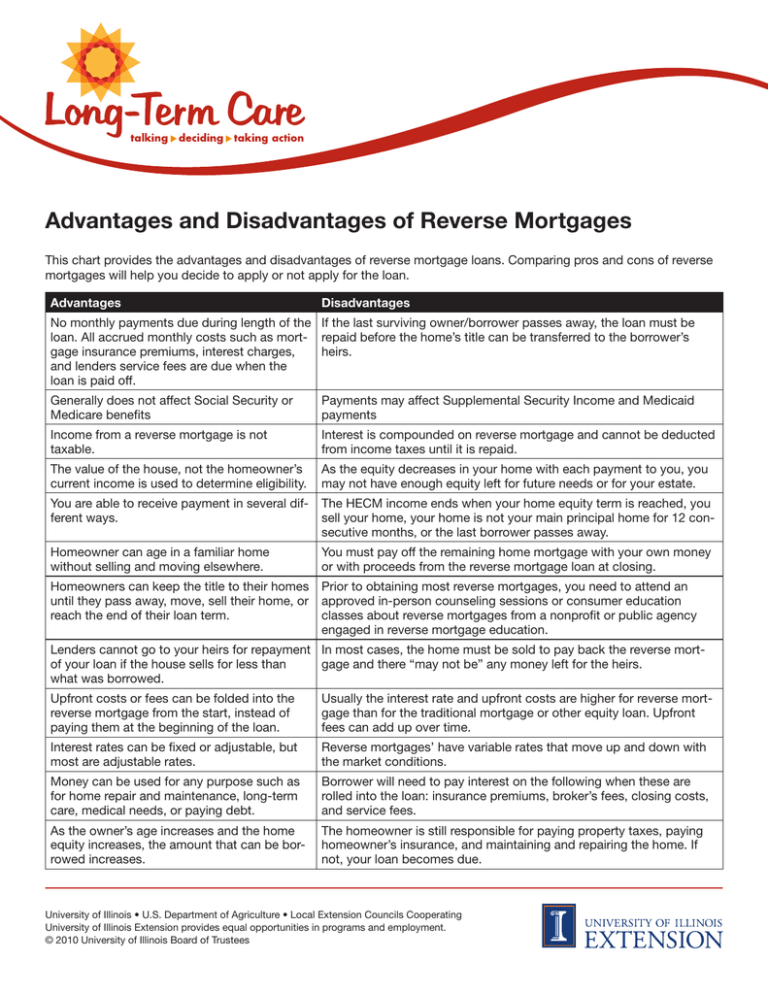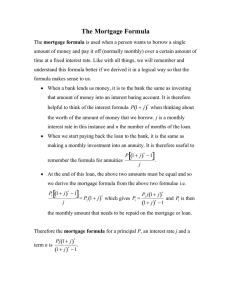Advantages and Disadvantages of Reverse - Long
advertisement

Advantages and Disadvantages of Reverse Mortgages This chart provides the advantages and disadvantages of reverse mortgage loans. Comparing pros and cons of reverse mortgages will help you decide to apply or not apply for the loan. Advantages Disadvantages No monthly payments due during length of the If the last surviving owner/borrower passes away, the loan must be loan. All accrued monthly costs such as mort- repaid before the home’s title can be transferred to the borrower’s gage insurance premiums, interest charges, heirs. and lenders service fees are due when the loan is paid off. Generally does not affect Social Security or Medicare benefits Payments may affect Supplemental Security Income and Medicaid payments Income from a reverse mortgage is not taxable. Interest is compounded on reverse mortgage and cannot be deducted from income taxes until it is repaid. The value of the house, not the homeowner’s current income is used to determine eligibility. As the equity decreases in your home with each payment to you, you may not have enough equity left for future needs or for your estate. You are able to receive payment in several different ways. The HECM income ends when your home equity term is reached, you sell your home, your home is not your main principal home for 12 consecutive months, or the last borrower passes away. Homeowner can age in a familiar home without selling and moving elsewhere. You must pay off the remaining home mortgage with your own money or with proceeds from the reverse mortgage loan at closing. Homeowners can keep the title to their homes until they pass away, move, sell their home, or reach the end of their loan term. Prior to obtaining most reverse mortgages, you need to attend an approved in-person counseling sessions or consumer education classes about reverse mortgages from a nonprofit or public agency engaged in reverse mortgage education. Lenders cannot go to your heirs for repayment In most cases, the home must be sold to pay back the reverse mortof your loan if the house sells for less than gage and there “may not be” any money left for the heirs. what was borrowed. Upfront costs or fees can be folded into the reverse mortgage from the start, instead of paying them at the beginning of the loan. Usually the interest rate and upfront costs are higher for reverse mortgage than for the traditional mortgage or other equity loan. Upfront fees can add up over time. Interest rates can be fixed or adjustable, but most are adjustable rates. Reverse mortgages’ have variable rates that move up and down with the market conditions. Money can be used for any purpose such as for home repair and maintenance, long-term care, medical needs, or paying debt. Borrower will need to pay interest on the following when these are rolled into the loan: insurance premiums, broker’s fees, closing costs, and service fees. As the owner’s age increases and the home equity increases, the amount that can be borrowed increases. The homeowner is still responsible for paying property taxes, paying homeowner’s insurance, and maintaining and repairing the home. If not, your loan becomes due. University of Illinois • U.S. Department of Agriculture • Local Extension Councils Cooperating University of Illinois Extension provides equal opportunities in programs and employment. © 2010 University of Illinois Board of Trustees


